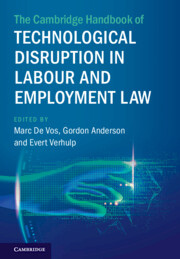Book contents
- The Cambridge Handbook of Technological Disruption in Labour and Employment Law
- The Cambridge Handbook of Technological Disruption in Labour and Employment Law
- Copyright page
- Contents
- Figures
- Tables
- Contributors
- 1 Technology and Law for the Future of Work We Want
- 2 The International Labour Organisation and the Future of Work
- 3 The Digitalisation of Work and the EU: Jurisprudential and Regulatory Responses in the Labour and Social Field
- 4 The Impact of Technological Disruption on German Labour Law: Risks and Opportunities
- 5 Austria: The Corporatist Perspective on Technological Disruption
- 6 Technological Disruption in Employment and Labour Law in the Netherlands
- 7 The Digitalisation of Labour Law in France
- 8 Italian Labour Law: Trends and Developments Put to the Test of Technological Disruption
- 9 Spain: Towards a New Architecture for Labour Law Institutions
- 10 Technological Developments and Industrial Relations in Denmark
- 11 Poland: Old and New Legal Concepts in the Changing World of Work
- 12 Technological Disruption and the Evolution of Labour Law in Hungary
- 13 Digitalisation and Disruption of Labour Relations in Estonia
- 14 Israel: New Trends in Israeli Labour and Employment Law
- 15 United Kingdom: Labour Law and Technological Authoritarianism at Work: Past, Present, and Future
- 16 Old Problems and New Technologies in the American Workplace
- 17 Australia: Reimagining the Regulation of Work
- 18 Technological Disruption and the Future of Work in Aotearoa/New Zealand
- 19 Technological Disruptions in Labour and Employment Law: South Africa
- 20 Japan: Labour Law and Policy in an Era of Technological Innovation
- 21 The Republic of Korea: Old Regulations and New Challenges in the World of Work
- 22 Technological Disruption and Labour Law: Between Utopia and Dystopia
10 - Technological Developments and Industrial Relations in Denmark
Published online by Cambridge University Press: 07 December 2023
- The Cambridge Handbook of Technological Disruption in Labour and Employment Law
- The Cambridge Handbook of Technological Disruption in Labour and Employment Law
- Copyright page
- Contents
- Figures
- Tables
- Contributors
- 1 Technology and Law for the Future of Work We Want
- 2 The International Labour Organisation and the Future of Work
- 3 The Digitalisation of Work and the EU: Jurisprudential and Regulatory Responses in the Labour and Social Field
- 4 The Impact of Technological Disruption on German Labour Law: Risks and Opportunities
- 5 Austria: The Corporatist Perspective on Technological Disruption
- 6 Technological Disruption in Employment and Labour Law in the Netherlands
- 7 The Digitalisation of Labour Law in France
- 8 Italian Labour Law: Trends and Developments Put to the Test of Technological Disruption
- 9 Spain: Towards a New Architecture for Labour Law Institutions
- 10 Technological Developments and Industrial Relations in Denmark
- 11 Poland: Old and New Legal Concepts in the Changing World of Work
- 12 Technological Disruption and the Evolution of Labour Law in Hungary
- 13 Digitalisation and Disruption of Labour Relations in Estonia
- 14 Israel: New Trends in Israeli Labour and Employment Law
- 15 United Kingdom: Labour Law and Technological Authoritarianism at Work: Past, Present, and Future
- 16 Old Problems and New Technologies in the American Workplace
- 17 Australia: Reimagining the Regulation of Work
- 18 Technological Disruption and the Future of Work in Aotearoa/New Zealand
- 19 Technological Disruptions in Labour and Employment Law: South Africa
- 20 Japan: Labour Law and Policy in an Era of Technological Innovation
- 21 The Republic of Korea: Old Regulations and New Challenges in the World of Work
- 22 Technological Disruption and Labour Law: Between Utopia and Dystopia
Summary
Denmark is a Scandinavian country of 5.8 million inhabitants. It is a constitutional monarchy, and state powers are divided between the parliament (legislative), the government (executive), and the courts (judiciary). The rule of law is a fundamental principle in the Danish legal system. Denmark is one of the richest countries in the world, and presumably also among the happiest. In the area of digitalisation, Denmark is among the most digitalised countries in the EU as well as globally.
Keywords
- Type
- Chapter
- Information
- Publisher: Cambridge University PressPrint publication year: 2023

